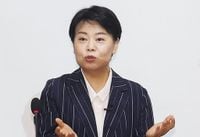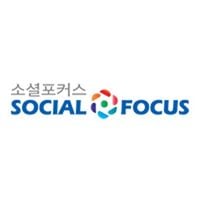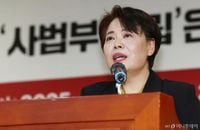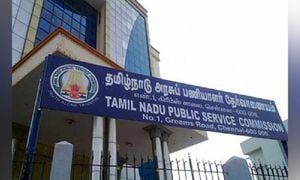In a striking moment for South Korean politics, Yoon Hee-suk, the head of the Yeouido Research Institute, delivered a candid and critical address during the People Power Party's policy broadcast on April 24, 2025. This speech, which aired on KBS, marked a significant shift as Yoon expressed deep remorse over the party's recent actions, particularly in relation to the controversial impeachment crisis instigated by former President Yoon Seok-yeol.
Yoon's remarks came at a time when the party is grappling with its identity and direction ahead of the upcoming elections. He stated, "The People Power Party is currently deeply mired in despair. I sincerely apologize to the people," highlighting the party's failure to maintain the trust of the electorate. This apology signals a potential turning point as the party seeks to distance itself from past controversies.
During his speech, Yoon reflected on the political dynamics that led to the impeachment crisis, which he characterized as a result of a political culture that panders to power. "Politics that pursue such incompetence or that cannot stop it, and politics that pander to power, reap a shameful result like impeachment," he asserted. His comments drew attention to the need for accountability within the party, emphasizing that their actions had left the public feeling alienated and disillusioned.
In a broader context, Yoon's address also criticized the Democratic Party, suggesting that the impeachment was a symptom of a deeper malaise in South Korean politics. He described the political environment as one where the majority party paralyzed the government, creating a state of dysfunction. "The past three years have been a state of no government in which the majority party has paralyzed the government with the number of seats in the National Assembly," he noted, calling for a reevaluation of political strategies moving forward.
Yoon's comments also touched on the internal strife within the People Power Party, referencing the forced removal of two party representatives, Lee Jun-seok and Kim Gi-hyeon, as emblematic of the party's struggles. He stated, "The President is assassinating the spirit and forcibly removing two party representatives, and politics that pander to the President, such as lawmakers turning their backs, reap a shameful result like impeachment." This admission reflects a growing recognition within the party of the detrimental effects of its internal politics.
Furthermore, Yoon proposed a radical shift in the party's approach to leadership. He suggested that the next president should abandon party affiliation upon taking office, declaring themselves as a representative of the people rather than a party member. "The day he takes office, he must throw away his party affiliation and declare that he is not the No. 1 party member, but the No. 1 citizen," he stated, advocating for a new political paradigm that prioritizes citizen engagement over partisan loyalty.
In light of the upcoming elections, Yoon emphasized the need for immediate action to rectify the political landscape. He called for the new president to assume the role of a "3-year President" who would focus on stabilizing the economy and addressing the current political crisis. He urged the new leader to promise to hold simultaneous elections in April 2028, advocating for a commitment to reform that would restore public confidence.
Yoon's speech resonated with many within the party, including Kwon Seong-dong, the floor leader of the People Power Party, who expressed agreement with the sentiment behind Yoon's remarks. Kwon stated, "I think our lawmakers and most party members believe that we have fallen short in communicating with the party and building a horizontal and healthy party relationship, which the people will recognize." This acknowledgment of past failures suggests a collective desire for change within the party.
As the People Power Party navigates these tumultuous waters, the implications of Yoon's speech extend beyond mere rhetoric. It represents a critical moment of introspection and potential transformation for a party seeking to redefine its role in South Korean politics. The call for accountability, coupled with a vision for a more citizen-centric approach to governance, may pave the way for a renewed political landscape.
In conclusion, Yoon Hee-suk's candid acknowledgment of the People Power Party's shortcomings and his proposals for future leadership reflect a significant shift in the party's narrative. As South Korea prepares for its next presidential election, the call for a new political paradigm emphasizes the importance of accountability and responsiveness to the electorate. The future of the People Power Party may hinge on its ability to embrace these changes and restore public trust.






